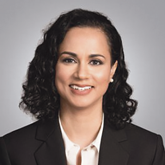Trinity Health’s Dameka Miller offers her perspective as a sourcing leader

To navigate the multifaceted challenges and complexity of managing the supply chain for a multibillion-dollar healthcare system, Dameka Miller, VP of Strategic Sourcing and Value Analysis for Trinity Health, places people first. While her focus may be non-labor expense, it is ultimately the needs of people—patients, hospital staff and teams—that informs her leadership perspective. Her work was recently highlighted in the “Women Leaders in Supply Chain” issue of Journal of Healthcare Contracting. We met with Miller to discuss the current state of supply chain management as well as her vision for the future.
Q: Please tell us about your role/responsibilities within your organization.
A: I have the privilege of working with a passionate and talented team of individuals committed to Trinity’s vision of improving the health of our communities and each person we serve. Together we lead sourcing, value analysis, supplier quality and impact purchasing programs to manage over $8 billion in non-labor expense across 25 states, 88 hospitals, 131 continuing care locations, the second largest PACE program in the country and 125 urgent care locations.
Q: In what ways has the supply chain changed that makes value analysis more important to hospitals and health systems?
A: Value analysis is essential to delivering patient care right now. Product accessibility has not completely recovered post-pandemic. While PPE is available, shortages and backorders for a significant number of critical patient care items persist. The daily work of value analysis teams has shifted to addressing product shortages, providing guidance on utilization to conserve supply and verifying alternate items that allow us to continue treating our patients safely.
Q: Has anyone mentored you during your career? If so, can you tell us about that?
A: My career began with three mentors who shaped who I am as a leader. They were my direct leaders, and for them, leadership was about making others better. There was intentional focus on both my personal and professional goals, and they positioned me for continued growth opportunities. Nearly 20 years later, one remains a mentor, and when I thank her for the impact she has had on my life, she reminds me to pay it forward. I was incredibly fortunate to begin my career with people-focused leaders and aim to have the same impact on others.
Q: How do you focus on your growth as a leader?
A: I study leaders across industries for reflection on leadership styles and philosophies that led to incredible successes and failures. I am most inspired by the podcast, “How I Built This,” featuring stories of entrepreneurs that built well-known brands and what they learned as they established their companies. It is also important for me to know how I am showing up and perceived by others, so I regularly ask for feedback from my own leader, who I trust and respect. I am purposeful about initiating the conversation to create space for honest, real-time observations. Finally, mentoring emerging leaders keeps my perspective fresh and offers insight into what motivates the next generation.
Q: What project or initiative are you looking forward to working on in the next three to six months?
A: Trinity’s vision of improving the health of our communities, and each person we serve, inspires me and my team. It gives our work purpose. We have been building an Impact Purchasing Program, which is the intentional use of our buying power to positively impact the communities we serve. Over the next several months, we will be focused on local spend and sustainability to continue the growth and development of the Impact Purchasing Program.
Share Email DEI, Q1 2023





